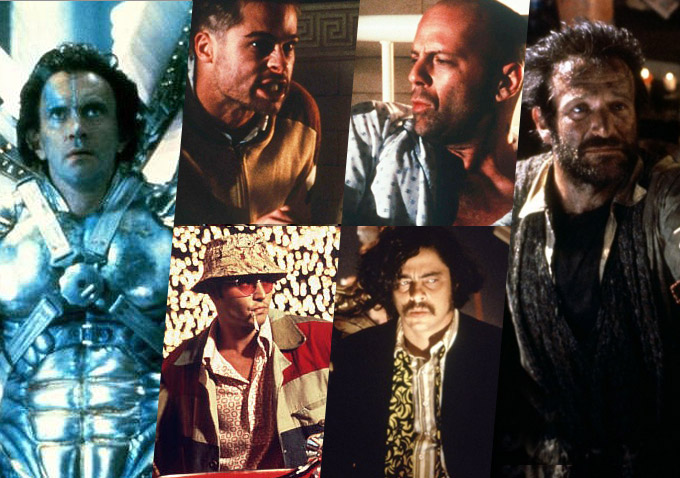
13. “The Brothers Grimm” (2005)
Gilliam’s filmography contains all shades of good and bad, but it has few entries that are as bafflingly forgettable as his first outing after a seven-year hiatus (due to, among other things, the disastrous attempt at “The Man Who Killed Don Quixote”), 2005’s “The Brothers Grimm.” Despite some impressive production design, a game, likable cast in Matt Damon and Heath Ledger, with Monica Bellucci perfectly cast as an evil fairytale queen to boot, the film is a meandering muddle, constantly wandering around in search of a plot, occasionally threatening to become interesting but inevitably losing its way again soon after. Whether the problems sprang from Ehren Kruger’s original script (which suffers from the same slack plotting and logic leaps that Kruger’s ‘Transformers’ sequels scripts are dogged by) or whether Gilliam and frequent collaborator Tony Grisoni monkeyed with what was there to the degree that it become the directionless mess it is, “The Brothers Grimm” barely made its production budget back and retrospectively seems to usher in the later, relatively unlovable portion of Gilliam’s career on an already bum note. Add to that the reports of on-set tensions, especially between Gilliam and the Weinstein brothers (who fired Gilliam’s first-choice of cinematographer six weeks into shooting), and you have a kind of platonic ideal of what you don’t want your long-awaited return to screens to become. Perhaps it’s almost lucky, then, that the film is not actively worse than it is. It’s not terrible, not objectionable, just oddly pointless and bland, and as such the outlier in Gilliam’s already inconsistent catalog.

12. “The Zero Theorem” (2013)
Gilliam has referred to his back catalog in terms of what he sees as thematic trilogies, of which the first, encompassing “Time Bandits,” “Brazil” and “The Adventures of Baron Munchausen” formed a “Trilogy of the Imagination” about the ages of man —from childhood, to the so-called prime of life, to the decline into old age . We’re not sure how useful that classification is in general, but it’s possible that “The Zero Theorem” could be counted as the fourth in that grouping, with Christoph Waltz’s Qohen going even further than Baron Munchausen’s remit, and looking out beyond his life into the metaphysics of what happens after death. Bald as a baby (there’s a hint of a kind of reincarnation motif throughout), Qohen is a drone, albeit a gifted one engaged in a seemingly nonsensical and neverending job for a very Gilliam-esque faceless corporation while he waits for a phone call that never comes. So far, so trademark absurd, but there is a kind of internal coherence to “The Zero Theorem” that sets it above Gilliam’s other late-period disappointments, especially his previous feature “The Imaginarium of Dr Parnassus.” Its production design may feel oddly archaic for a supposed futurescape, and its female characters may be unforgivably one-dimensional (Melanie Thierry gets a very raw deal), but “The Zero Theorem” finds Gilliam in more reflective form beneath the standard-issue zaniness, and there’s a kind of dream logic to how the film unfolds. There are also some very cherishable elements in terms of performances. Waltz’s Qohen starts off a bundle of tics and awkward mannerisms, but as the film goes on, he develops into a surprisingly touching character, while Tilda Swinton, Matt Damon, David Thewlis, Peter Stormare and Ben Whishaw all pop up to provide color and quirk to the background. It’s by no means an unqualified success, but it has heart and smarts beneath its gaudy exterior, making it by some distance the best of Gilliam’s late-period films.

11. “Jabberwocky” (1977)
Terry Gilliam‘s solo directorial debut (very, very loosely inspired by Lewis Carroll‘s poem of the same name in “Alice in Wonderland“) is hardly a massive departure from Gilliam’s previous picture, “Monty Python And The Holy Grail.” In fact, it was even billed as “Monty Python’s Jabberwocky” on its U.S. release, much to Gililam’s displeasure. It’s perhaps because of those similarities that the film remains thought of as a minor, forgotten work in the director’s canon, but while it’s certainly made by a filmmaker still finding his own voice, there’s plenty to recommend on its own terms. Michael Palin takes the lead role as Dennis, a young man in medieval times who heads to the big city to become an accountant, only to be picked to slay the legendary monster of the title. It’s a thin, pastiche-y plot, designed to be taken a little more seriously than ‘Grail’ (and there’s some dark, positively scary moments when the beast finally turns up), but is nonetheless uneven. It’s more “Your Highness” than “The Princess Bride,” with Gilliam’s gags owing as much to pre-Python British comedy of the music hall era as to his comedy supergroup day job. But it is fitfully funny and is an early indication of the world-building that would later mark his work. This is as mucky and murky a representation of the middle ages as you could ask for, seeing as the filmmaker was making the most out of what had to be a relatively meager budget. Not a total triumph, but an interesting look at a director in transition, for whom much better was to come…






And yet again "The Adventures of Baron Manchausen" is criminally underrated in an assessement of Gilliam\’s films… And it says a lot about the age of your staff that "Fear and Loathing" is ranked so high!